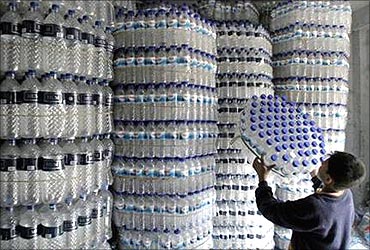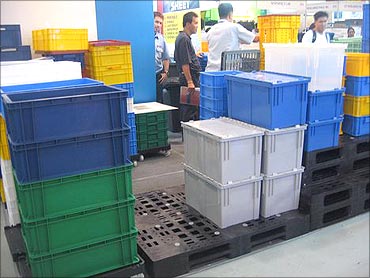Photographs: Reuters Dilip Kumar Jha in Mumbai
The industry's representative body, the FRP Institute. has tied-up with Mumbai-based University Department of Chemical Technology to launch diploma and certificate courses in reinforced plastics composites.
UDCT is first conducting a summer vacation course with a batch of 40 students this year; there will be one in the winter season, too. After that, the course will be run through the year.
The institute is looking at more such tie-ups with other business schools.
Pradip Thakkar, chairman of the FRP Institute said: "The biggest challenge before us is to generate skilled manpower in the industry, which is currently affected badly by the lack of innovations over several years.
A job after college? Try reinforced plastics
Image: Sector has 100,000 employeesPhotographs: Reuters
The industry requires skilled manpower for the next generation's growth, for which we need to start today, Thakkar added.
Today, the industry employs nearly 100,000 people directly and indirectly, of which 40 per cent are skilled. Investment worth about Rs 20,000 crore (Rs. 200 billion) is in the pipeline for the next five years. The industry requires another 100,000 professionals to deliver the demand of user industries.
A job after college? Try reinforced plastics
Image: Consumption of composites products is lowPhotographs: Reuters
"The RCF officials were impressed with our views on the extensive use of composites and assured consideration of our proposal. Until now, they have been using more of steel materials, which, if replaced with composites, will not only save energy for running coaches due to lighter weight but also save investment money," Thakkar added.
The industry has proposed the government exempt composites' products from excise duty and allow 100 per cent depreciation on capital investment in composites' products The government must include such items in its focused product scheme for exports, Thakkar said.
Despite being a good conductor of electricity and being light weight, long lasting and maintenance-free, per capita consumption of composites products in India is 0.25 kg, as against 10 kg in America.






article